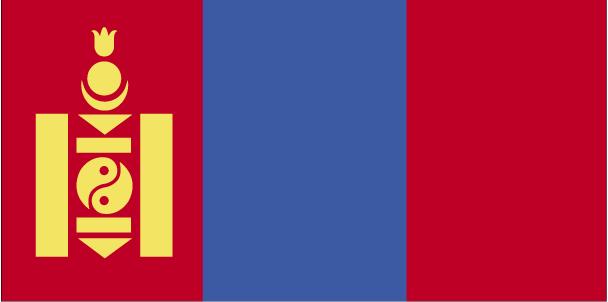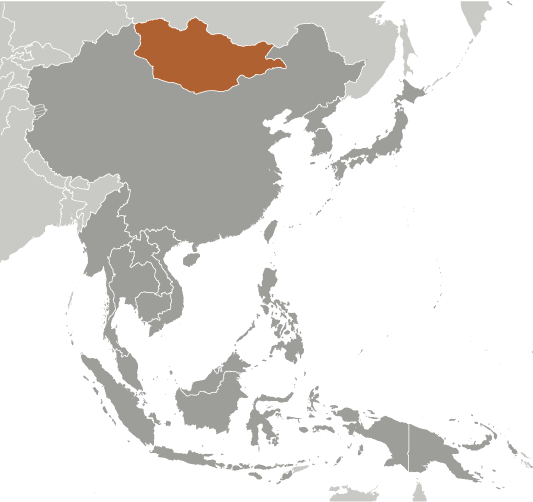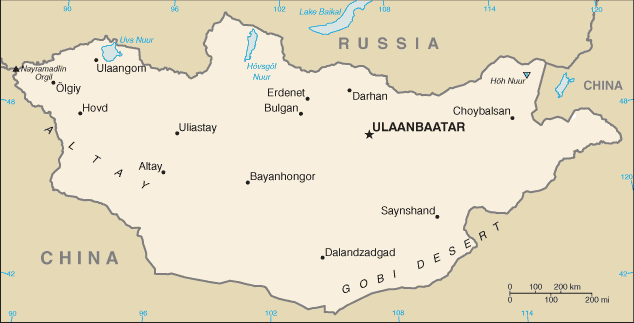The Mongols gained fame in the 13th century when under Chinggis KHAN they established a huge Eurasian empire through conquest. After his death the empire was divided into several powerful Mongol states, but these broke apart in the 14th century. The Mongols eventually retired to their original steppe homelands and in the late 17th century came under Chinese rule. Mongolia won its independence in 1921 with Soviet backing and a Communist regime was installed in 1924. The modern country of Mongolia, however, represents only part of the Mongols' historical homeland; more Mongols live in the Inner Mongolia Autonomous Region in the People's Republic of China than in Mongolia. Following a peaceful democratic revolution, the ex-Communist Mongolian People's Revolutionary Party (MPRP) won elections in 1990 and 1992, but was defeated by the Democratic Union Coalition (DUC) in the 1996 parliamentary election. The MPRP won an overwhelming majority in the 2000 parliamentary election, but the party lost seats in the 2004 election and shared power with democratic coalition parties from 2004-08. The MPRP regained a solid majority in the 2008 parliamentary elections but nevertheless formed a coalition government with the Democratic Party. The prime minister and most cabinet members are MPRP members.
Country Name
Conventional long form:none
Conventional short form:Mongolia
Local long form:none
Local short form:Mongol Uls
Former:Outer Mongolia
Government Type
parliamentary
Capital
Name:Ulaanbaatar
Geographic coordinates:47 55 N, 106 55 E
Time difference:UTC+8 (13 hours ahead of Washington, DC during Standard Time)
Administrative divisions
21 provinces (aymguud, singular - aymag) and 1 municipality* (singular - hot); Arhangay, Bayanhongor, Bayan-Olgiy, Bulgan, Darhan-Uul, Dornod, Dornogovi, Dundgovi, Dzavhan (Zavkhan), Govi-Altay, Govisumber, Hentiy, Hovd, Hovsgol, Omnogovi, Orhon, Ovorhangay, Selenge, Suhbaatar, Tov, Ulaanbaatar*, Uvs
Independence
11 July 1921 (from China)
National Holiday
Independence Day/Revolution Day, 11 July (1921)
Constitution
13 January 1992
Legal system
blend of Soviet and German systems that employ "continental" or "civil" code; case-precedent may be used to inform judges, but all decisions must refer to the law as written; constitution ambiguous on judicial review of legislative acts; has not accepted compulsory ICJ jurisdiction
Suffrage
18 years of age; universal
Executive branch
Chief of state:President Tsakhia ELBEGDORJ (since 18 June 2009)
Head of government:Prime Minister Sukhbaatar BATBOLD (since 29 October 2009); First Deputy Prime Minister (Norov ALTANKHUYAG (since 20 September 2008); Deputy Prime Minister Miegombyn ENKHBOLD (since 6 December 2007)
Cabinet:Cabinet nominated by the prime minister in consultation with the president and confirmed by the State Great Hural (parliament)
(For more information visit the World Leaders website)
Elections: presidential candidates nominated by political parties represented in State Great Hural and elected by popular vote for a four-year term (eligible for a second term); election last held on 24 May 2009 (next to be held in May 2013); following legislative elections, leader of majority party or majority coalition usually elected prime minister by State Great Hural
Election results:in elections in May 2009, Tsakhia ELBEGDORJ elected president; percent of vote - Tsakhia ELBEGDORJ 51.2%, Nambaryn ENKHBAYAR 47.4%, others 1.3%
Legislative branch
unicameral State Great Hural 76 seats; members elected by popular vote to serve four-year terms
Elections:last held on 29 June 2008 (next to be held in June 2012)
Election results: percent of vote by party - NA; seats by party - MPRP 46, DP 27, others 3
Judicial branch
Supreme Court (serves as appeals court for people's and provincial courts but rarely overturns verdicts of lower courts; judges are nominated by the General Council of Courts and approved by the president)
Political Parties and Leaders
Democratic Party or DP [Norov ALTANHUYAG]; Mongolian People's Revolutionary Party or MPRP [Sukhbaatar BATBOLD]
Political pressure groups and leaders
Other:human rights groups; women's groups
International organization participation
ADB, ARF, CD, CICA, CP, EBRD, FAO, G-77, IAEA, IBRD, ICAO, ICCt, ICRM, IDA, IFAD, IFC, IFRCS, ILO, IMF, IMO, Interpol, IOC, IOM, IPU, ISO, ITSO, ITU, ITUC, MIGA, MINURCAT, MINURSO, MONUC, NAM, OPCW, OSCE (partner), SCO (observer), UN, UNCTAD, UNESCO, UNIDO, UNMIL, UNMIS, UNWTO, UPU, WCO, WFTU, WHO, WIPO, WMO, WTO
Diplomatic representation in the US
Chief of mission:Ambassador Khasbazaryn BEKHBAT
Chancery:2833 M Street NW, Washington, DC 20007
Telephone: [1] (202) 333-7117
FAX:[1] (202) 298-9227
Consulate(s) general:New York
Diplomatic representation from the US
Chief of mission:Ambassador Jonathan ADDLETON
Embassy:Big Ring Road, 11th Micro Region, Ulaanbaatar, 14171 Mongolia
Mailing address:PSC 461, Box 300, FPO AP 96521-0002; P.O. Box 1021, Ulaanbaatar-13
Telephone: [976] (11) 329-095
FAX:[976] (11) 320-776
Flag description
three equal, vertical bands of red (hoist side), blue, and red; centered on the hoist-side red band in yellow is the national emblem ("soyombo" - a columnar arrangement of abstract and geometric representation for fire, sun, moon, earth, water, and the yin-yang symbol)










